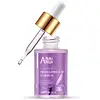What's inside
What's inside
 Key Ingredients
Key Ingredients

 Benefits
Benefits

 Concerns
Concerns

No concerns
 Ingredients Side-by-side
Ingredients Side-by-side

Aloe Barbadensis Leaf
MaskingTranexamic Acid
AstringentNiacinamide
SmoothingGlycereth-26
HumectantBetaine
HumectantPropanediol
Solvent1,2-Hexanediol
Skin ConditioningSodium Hyaluronate
HumectantAllantoin
Skin ConditioningXanthan Gum
EmulsifyingCitric Acid
BufferingCamellia Sinensis Leaf
PerfumingSambucus Nigra Flower
Skin ConditioningMomordica Charantia Fruit Extract
Skin ConditioningLeontopodium Alpinum Callus Lysate
Skin ConditioningWater
Skin ConditioningTranexamic Acid
AstringentNiacinamide
SmoothingAlpha-Arbutin
AntioxidantArginine
MaskingSodium Hyaluronate
HumectantHydrolyzed Sodium Hyaluronate
Skin ConditioningCarbomer
Emulsion StabilisingButylene Glycol
HumectantGardenia Florida Fruit Extract
Skin ConditioningLavandula Angustifolia Flower Extract
CleansingPhellodendron Amurense Bark Extract
Skin Conditioning1,2-Hexanediol
Skin ConditioningPentylene Glycol
Skin Conditioning
 Reviews
Reviews

Ingredients Explained
These ingredients are found in both products.
Ingredients higher up in an ingredient list are typically present in a larger amount.
1,2-Hexanediol is a synthetic liquid and another multi-functional powerhouse.
It is a:
- Humectant, drawing moisture into the skin
- Emollient, helping to soften skin
- Solvent, dispersing and stabilizing formulas
- Preservative booster, enhancing the antimicrobial activity of other preservatives
Niacinamide is a multitasking form of vitamin B3 that strengthens the skin barrier, reduces pores and dark spots, regulates oil, and improves signs of aging.
And the best part? It's gentle and well-tolerated by most skin types, including sensitive and reactive skin.
You might have heard of "niacin flush", or the reddening of skin that causes itchiness. Niacinamide has not been found to cause this.
In very rare cases, some individuals may not be able to tolerate niacinamide at all or experience an allergic reaction to it.
If you are experiencing flaking, irritation, and dryness with this ingredient, be sure to double check all your products as this ingredient can be found in all categories of skincare.
When incorporating niacinamide into your routine, look out for concentration amounts. Typically, 5% niacinamide provides benefits such as fading dark spots. However, if you have sensitive skin, it is better to begin with a smaller concentration.
When you apply niacinamide to your skin, your body converts it into nicotinamide adenine dinucleotide (NAD). NAD is an essential coenzyme that is already found in your cells as "fuel" and powers countless biological processes.
In your skin, NAD helps repair cell damage, produce new healthy cells, support collagen production, strengthen the skin barrier, and fight environmental stressors (like UV and pollution).
Our natural NAD levels start to decline with age, leading to slower skin repair, visible aging, and a weaker skin barrier. By providing your skin niacinamide, you're recharging your skin's NAD levels. This leads to stronger, healthier, and younger looking skin.
Another name for vitamin B3 is nicotinamide. This vitamin is water-soluble and our bodies don't store it. We obtain Vitamin B3 from either food or skincare. Meat, fish, wheat, yeast, and leafy greens contain vitamin B3.
The type of niacinamide used in skincare is synthetically created.
Learn more about NiacinamideSodium Hyaluronate is hyaluronic acid's salt form. It is commonly derived from the sodium salt of hyaluronic acid.
Like hyaluronic acid, it is great at holding water and acts as a humectant. This makes it a great skin hydrating ingredient.
Sodium Hyaluronate is naturally occurring in our bodies and is mostly found in eye fluid and joints.
These are some other common types of Hyaluronic Acid:
Learn more about Sodium HyaluronateTranexamic Acid is best used for treating hyperpigmentation, discoloration, and melasma. It can also help build a stronger skin barrier.
Once applied, Tranexamic Acid starts decreasing inflammation from UV exposure. Tranexamic Acid also prevents our skin cells from meeting the pigment production cells.
Its brightening property makes it great at reducing the appearance of acne scars and marks.
Fun fact: Tranexamic Acid is also a medication used to reduce heavy bleeding.
This acid is derived from lysine, an amino acid.
Learn more about Tranexamic Acid